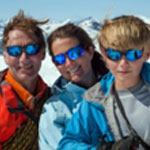- About the ACC
- Membership
- Huts
- Adventures
POLICIES & INSURANCE
- COMMUNITY
- Environment
- Shop
- Give
If you’re planning on venturing onto a glacier this winter, it is vital that you practice or refresh your crevasse rescue skills. And who better do it with than Canada’s national mountaineering organization?
Our Winter 2024 offerings are led by our highly experienced Lead Winter Guide, Doug Latimer. Doug is currently authoring an e-book on the subject (to be included in your course fee if completed in time) and will teach all of the skills necessary to maximize safety skiing across glaciated terrain and deal with a crevasse fall scenario.
The course will start with an evening session the Thursday before your field day where you will go over gear, take a look at systems to understand how they work and review basic knots. The Saturday will be the field day where you will dive into hands on learning at a climbing crag, like Rundle Rock. Here you will set up different systems and practice setting up anchors. On the final field day, the group will have the opportunity to ski to a glacial environment to practice the systems and apply the skills learned in a realistic setting.
BOOKING INFORMATION
Dates:
November 25TH-26TH 2023
December 30TH-31ST 2023
Price: $375+ TAX
MORE INFORMATION
Please try to register online before calling. If you are having issues please try to have your emergency contact information and course questionnaire filled out before calling.
OR Call: (403)-678-3200 ext 213
Skills you’ll learn on this course include
Day 1 (Online evening session)
Day 2
Day 3
Introductory
This camp is introductory, however, you will get more out of this course if you know basic climbing knots and are familiar with glacier gear.
Food
Food is not provided as part of the course. Please bring along a packed lunch and some snacks for your field days.
Accommodation
As this course is offered out of the ACC Clubhouse in Canmore, we invite all out-of-town participants to stay with us. Located on a high bench overlooking the Three Sisters, Ha Ling and Mount Rundle, the ACC Clubhouse hostel is the perfect place to relax while completing your Crevasse Rescue Course. You can reserve a room for the night between your classroom day and field day upon reservation. Or if you need to stay longer, call our reservations team on 403 678 3200 ext. 300.
For full details on the Canmore Clubhouse accommodation click here.
Guiding
Our on-staff ACC guide, Doug Latimer, oversees our crevasse rescue program. Doug has almost 20 years of experience in teaching instructional courses and is currently writing his own e-book on crevasse rescue which we hope to include with the course as soon as it is available. We are extremely excited to have him on board for another season after rave reviews in his past years working with us.
We want to provide the best possible learning experience and give you maximum opportunity to ask questions. So, for our field days, we bring in an extra guide/instructor where necessary to keep participant-to-guide ratios below a maximum of 6:1.
The ACC hires guides certified by the Association of Canadian Mountain Guides (ACMG). Visit the ACMG website to learn more about what they do!

Rentals
If you don’t have everything on the gear list and aren’t ready to invest in your own, there are many awesome local businesses that rent out all of the equipment you will need. Be sure to reserve your rentals ahead of time to make sure everything you need is available for you when you need it.
Doug Latimer
Doug has 20+ years of guiding experience behind him as an ACMG ski guide and an ACMG apprentice rock guide. As well as his private guiding he has spent a number of years working for the UoC where he taught a range of instructional programs in avalanche training, crevasse rescue and backcountry ski and ski mountaineering. He also somehow finds time to run a multimedia production company! On top of all that, we are lucky to have Doug as our lead winter guide, where he shares his fantastic enthusiasm and extensive knowledge throughout our winter programs.

We sell Tugo® Travel Insurance suitable for both ACC Adventures and personal trips:
INCLUDED WITH YOUR CAMP FEE
PARTICIPANTS MUST PROVIDE
ORGANIZING FANTASTIC ACC ADVENTURES FOR OVER 100 YEARS
Input your search keywords and press Enter.